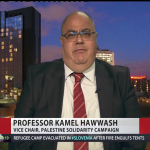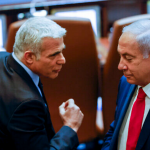Robert Fantina, author and journalist, says the US embassy takeover in Tehran showed Iranians would get their own way, regardless of the demands made by Washington.
Faraan: In an interview with FNA, Fantina said, “Like everyone else on the planet, [(Iranians)] they have the right to self-determination, and were not going to allow the US to deprive them of that right.”
Robert Fantina is an author, journalist and activist for peace and social justice. He writes extensively about the US foreign policy and West Asia. While living in the states, he actively opposed the war in Iraq, prior to and following the US invasion of that country. Shortly after the 2004 presidential election he moved to Canada. He serves on the boards of Canadian Voices for Palestinian Rights (CVPR) and Canadians for Peace and Justice in Kashmir (CPJK).
Below is the full text of the interview:
Q: November 4 marks the day when Iranian students stormed the US Embassy in Tehran over four decades ago, and the countries’ relations were severed. What was the message of the US Embassy takeover in Iran, which itself was a US-dependent state before the Islamic Revolution?
A: What the US likes to refer to as ‘help’ is just a cover to install a puppet regime in any country whose current government does not do its bidding. The US overthrew the democratically-elected government of Iran in 1953 and installed the brutal Shah of Iran, and supported him in his decades of oppression and terrorism. The storming and taking of the embassy in 1979 were strong signals to the US, following so closely the overthrow of the Shah, that the Iranian people would choose their own way. Like everyone else on the planet, they have the right to self-determination, and were not going to allow the US to deprive them of that right.
The people of Iran owe nothing to the US; indeed, the US has constantly worked to undermine their revolution; this continues to this day. Yet the people have prospered under difficult circumstances, including the current brutal, unjust and immoral sanctions.
Q: How do you find the US hegemony in West Asia nowadays as more nations in the region demonstrate their disapproval of Washington’s policies?
A: The US hegemony in the world is declining. One evidence of this is that Iran’s fuel deliveries to Lebanon went smoothly and without incident. Biden and his cohorts certainly recognize that crossing a line regarding aggression against Iran will bring in Russia and China, and hopefully the US government is not willing to risk a major world war to please apartheid Israel.
That nation itself did not dare stop the fuel deliveries; it will not act unless it knows that the US will support it militarily. Trump, who gave Israel whatever it wanted, is gone, and while Biden is a self-proclaimed Zionist, the progressive wing of the Democratic Party is one he must contend with. Israeli leaders will not be quite as bold in their commission of crimes against humanity as they were allowed to be when Trump was president. There are enough members in the US Congress who are not willing to fight a war for Israel over fuel deliveries to Lebanon.
Q: The US has withdrawn its forces from Afghanistan. It is leaving Iraq and Syria in a not-too-far future. Is it the extension of the trend that started from Iran?
A: The US is an empire in decline; its defeat in Afghanistan after a twenty-year war is only the most recent evidence of this. Yet such empires do not depart the global stage peacefully. The US is planning to leave Iraq and Syria, after long, brutal and immoral engagements in those countries, but it is threatening Iran now. It could be gathering its military resources for an invasion there. But it is also highly possible that its threats of violence against Iran – darkly hinted at as ‘all options are on the table’ – are simply throwbacks to its past trends of disdaining diplomacy in favor of war.
The US will not leave the Middle East completely until the influence of the Zionist entity there fades in the US Congress. That is already happening, as has been demonstrated by the recent defeats of some strong pro-Israel officials by those who believe in international law and human rights.










